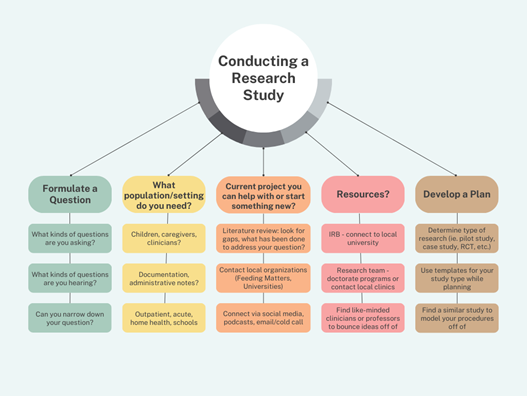My Experience Researching PFD
Published by Michelle McKay on Aug 08, 2023

Hello! I’m Michelle, and I am thrilled to share where my inspiration for becoming a feeding therapist came from and introduce my newest research project. I have a full-circle story of how I ended up working in the field of pediatric feeding. I am so passionate about working with these clients and their families.
When I was a junior in high school, a friend asked if I could help her babysit for a family in my neighborhood. I became this child’s habilitation and respite provider and began attending their therapy sessions. I loved all of them, but was particularly intrigued by his feeding therapy sessions. I started helping with his home program, introducing new foods, playing with new foods, and working on feeding skills at home. I knew that was the space that I wanted to be in when I grew up, and I worked hard to graduate with my doctorate in occupational therapy in 2020.
During my capstone in my OT program, I began a small research study, studying the interventions I was observing in feeding therapy. Unfortunately, in the middle of this experience, the COVID-19 pandemic hit, and I was unable to get my study off the ground.
I have always been a question-asker and answer-seeker, looking to research and clinicians with more experience for advice and support for how to best help my clients and their families. Since graduate school, I have been interested in returning to my research question and helping feeding therapists provide the most evidence-based interventions to support our clients and their families.
As a therapist, I get my evidence and best-practice by learning from families, colleagues, and reading the most current research. However, with pediatric feeding disorder as a new diagnosis and feeding therapy as an emerging practice area, research on feeding therapy interventions is scarce. This is the gap I’m trying to address as I begin my journey into conducting research.

- Formulate a question. What are common questions that you find yourself asking or that you are asked by families, other practitioners, or from people that you are mentoring? For me, I was often asking why are these the interventions that I keep coming back to. I ask myself daily how the strategies that I choose to use are helping my clients find success at mealtimes. I have asked the same questions of all of my mentors and frequently find caregivers or other health care providers asking the purpose of certain strategies that I bring to the table.
- What population/setting do you need? Could you answer your question using the data from your documentation? Do you need to study your clients or their caregivers or other clinicians? Where would you find data to support your research? Would you need to be in an outpatient clinic, a hospital or acute care setting, home health, school, etc.?
- Current project you can help with or start something new: Are there current research projects that are addressing your question or a question you’re interested in, or do you need to start your own? Start with a literature review to look for what’s been researched and where the gaps are. Contact organizations or communities that may be doing research (ie. Feeding Matters, Universities, etc.). Use social media to find others who are like-minded and connect with them. Don’t be afraid to send a DM or email to a researcher or clinician who you relate to who may be interested in helping with your idea.
- Resources: If you’ll be conducting research with human subjects, you will need an IRB. The best way to get an IRB is to connect with a university. Doctorate programs in the therapy fields are becoming more common and often have benefits for community research partners including access to student research teams, access to university libraries and libraries who can help with research design, and professors who may have similar interests or projects that you can model yours off of.
- Develop a plan. Through your literature search, determine which type of research fits your question and resources best. Will you be conducting qualitative or quantitative data? Do you have the resources and ability to pursue a randomized control trial, or would a pilot study or case study fit better? Take time to find the right research type for you. Use templates for research protocols, plans, and write-ups from the beginning that match your study type, especially if this is the first study you’re leading. During your literature review, look for strategies in their research protocols that you can model your procedures off of and save these ideas together to reference as you work on yours.